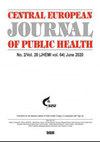医疗保健系统中素食者的营养实践和经验:一项定性研究。
IF 0.9
4区 医学
Q4 PUBLIC, ENVIRONMENTAL & OCCUPATIONAL HEALTH
引用次数: 0
摘要
目标:限制动物性食品消费的饮食越来越受欢迎,这对捷克的公共医疗系统来说是一个重要的新挑战。虽然媒体广泛讨论了植物性饮食对环境和健康的益处,但遵循这些饮食的人可能在营养建议甚至获得医疗保健方面缺乏专业支持。本研究旨在绘制捷克素食主义者的营养实践和医疗保健系统经验。方法:在一项定性研究中,我们对21名自我报告的成年纯素食者(14名女性和7名男性;18名受过大学教育)进行了半结构化访谈,这些人至少一年都在纯素饮食。我们特别感兴趣的是他们为什么以及如何成为素食主义者的动机;他们的日常饮食和饮食习惯;他们对医疗保健的使用以及与医疗专业人员相处的经验;他们的营养知识和补充剂的使用;以及他们对自己健康和化身的感知。结果:成为素食主义者的主要动机是道德、环境和健康。素食主义者认为自己和他们的饮食总体上更健康,但要做到这一点,他们必须花大量时间研究营养需求和他们需要什么样的膳食补充剂。为此,他们倾向于主要依靠非医疗信息来源。由于初级保健医生不接受素食主义,素食主义者往往不会寻求医疗建议或告诉医生他们的饮食习惯,以避免冲突和负面体验。结论:我们发现,对于那些不食用动物性食品的人来说,缺乏可获得的教育材料,获得初级保健建议的机会可能有限。这些发现值得进一步研究和制定公共卫生风险缓解策略。本文章由计算机程序翻译,如有差异,请以英文原文为准。
Nutritional practices and experiences of people on vegan diet with healthcare system: a qualitative study.
OBJECTIVES The growing popularity of diets that restrict the consumption of animal-based foods is an important new challenge for the public healthcare system in Czechia. While the environmental and health-related benefits of plant-based diets are widely discussed in the media, people who follow these diets may lack professional support in terms of nutritional advice and even access to healthcare. The present study aims to map the nutritional practices and experiences with the healthcare system of people in Czechia who follow vegan diets. METHODS In a qualitative study we conducted semi-structured interviews with twenty-one self-reported adult vegans (14 women and 7 men; 18 with university education) who were on a vegan diet for at least a year. We were specifically interested in their motivation for why and how they became vegans; their everyday diet and eating routines; their use of health care and experiences with medical professionals; their nutritional knowledge and use of supplementation; and their perception of their health and embodiment. RESULTS The primary motivations for going vegan are ethical, environmental and health-related. Vegans see themselves and their diet as generally healthier, but for this to be true they must spend a considerable amount of time researching nutritional requirements and what dietary supplements they need. To this end, they tend to rely mainly on non-medical sources of information. Because of the lack of acceptance of veganism among primary-care physicians, vegans tend not to seek out medical advice or tell their doctor about their eating habits in order to avoid conflicts and negative experiences. CONCLUSIONS We identified a perceived lack of accessible educational materials and potentially limited access to primary healthcare recommendations for people who eliminate the consumption of animal-based foods. These findings deserve further research and public health risk-mitigation strategies.
求助全文
通过发布文献求助,成功后即可免费获取论文全文。
去求助
来源期刊

Central European journal of public health
PUBLIC, ENVIRONMENTAL & OCCUPATIONAL HEALTH-
CiteScore
1.90
自引率
0.00%
发文量
45
期刊介绍:
The Journal publishes original articles on disease prevention and health protection, environmental impacts on health, the role of nutrition in health promotion, results of population health studies and critiques of specific health issues including intervention measures such as vaccination and its effectiveness. The review articles are targeted at providing up-to-date information in the sphere of public health. The Journal is geographically targeted at the European region but will accept specialised articles from foreign sources that contribute to public health issues also applicable to the European cultural milieu.
 求助内容:
求助内容: 应助结果提醒方式:
应助结果提醒方式:


